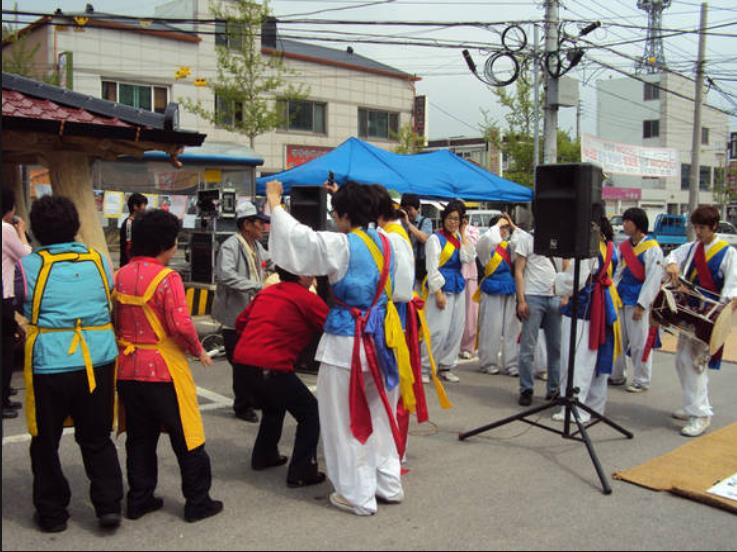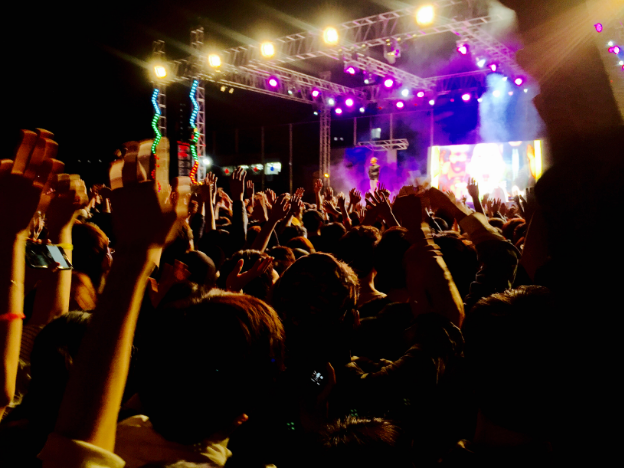The campus festival can sound romantic to freshmen and can be regarded as an opportunity to enjoy drinking and performing during the festival. The problem with the recent campus festival, however, is that it is overheated due to the celebrity performances and selling alcohol without a license at the university. Let's take a look at the problems and figure out some solutions.
A college festival where the drinking culture is activated
 |
The sales of alcohol at the campus festival has been a practice since 1980. The campus festival was begun with the aim of a grand festival in which the villagers share their food and drinks with each other. Many of the freshmen reportedly served their seniors and professors with drinks and snacks. They were hoping their campus life would be not ruined. The campus festival, which aims to host the grand festival, has also become a chance to professors and students to have a frank talk while drinking. In the campus festival, a small tent is set up on the campus by departments or clubs. A bar is also opened where the alcohol such as wine and soju are sold. In fact, the profit from the festival was usually used to support the club or department activities of the year. Furthermore, students were able to get a financial help as well.
Before long, the campus festival has become an indispensable content for celebrities. Because many entertainers can be seen for free at university festivals. Not only college students but also middle and high school students went to each university festival to watch those performances. Since the spring and fall festival season is just around the corner, the information about the celebrities coming to each university spreads on every social networking site. It will not be an exaggeration to say the success of the festival depends on who performs so each college student council competes for popular entertainers. According to a ministry survey, universities were using 34 million won, or 43 percent of the festival's budget for the celebrity performance. Some universities even sold paid tickets to people who hadn’t got tickets yet to cover the huge expenses of hosting celebrities.
The Ministry of Education's prohibition on drinking
 |
In the meantime, students sold alcohol in universities as a practice. In effect, the laws legally defined university bars should be operated under those of the liquor tax law and the law on punishment of the tax offenders. According to the current liquor tax law, it is strictly illegal to sell alcohol without permission from the local tax officer. In the case of liquor retail businesses such as bars, it is easy to obtain a license to sell liquor by reporting to the local government and registering with the National Tax Service. However, in the case of campus festival bars, they are often held on the road, not in the buildings, so they are not reported at the local government's business report stage. Therefore, all university festival bars cannot be open unless they get a building to run a bar. If they violate the liquor tax law they will be punished through a separate law called the National Tax Violation Act, which is severe enough to impose a sentence of less than three years in prison or a fine of 30 million won.
In 2017, Inha University sold alcohol purchased from a liquor company during the festival, but the National Tax Service imposed a crackdown on the liquor because of the lack of the license. After a series of procedures, they were promised not to run a bar on campus again rather than punishment. In May 2018, the Ministry of Education was asked by the National Tax Service to send each university an official notice to help universities meet the liquor tax law. The National Tax Service said, " If they operate a bar without a license to sell alcohol, they can be fined, and that they should refrain from running a bar at university festivals.
College bars have low entry barriers to teenagers, unlike regular bars registered as business owners. College students do not receive any training on banning teenagers from alcohol so they don’t really have the awareness that they should check ID cards when selling alcohol. This is why some point out that the campus festival is turning into “a place of derailment" where young people especially teenagers drink and play. In fact, high school students who were drinking alcohol at a bar at Wongwang University festival in Iksan, North Jeolla Province, were caught in May 2017. They were wearing plain clothes, not uniforms, and had already emptied several bottles of alcohol. The student council of Wonkwang University closed down the bar for minors. Jeonbuk University also checked ID cards for all students who entered bars during the festival in 2017. It was to block the entry of students who entered the school one year earlier than their college peers.
Also, he issues of selectivity has continuously been raised at the university festival. An incentive to solicit compliments through nasty talk. In 2017, a campus festival menu in Gangwon Province included “oppa Eokeumtang tang” and “taengtaenghan hwangdo” (2,900 won). There was no school investigation or disciplinary action. The school official said, " It is difficult for us to discipline students because the event is held by the student council. “
Some universities have sold paid tickets for celebrity performances because of the high cost of recruiting celebrities in the campus festival. However, the side effects followed on the paid ticket.
Korea University and Yonsei University sold paid tickets of the festival's celebrity performances. This paid ticket was first sold online. Students sold the paid tickets for two to three times higher than the original price. Konkuk University also distributed "student priority" to students, a free ticket for Konkuk University students to enter the concert hall three hours ahead of others, but they sold those to the public for 10,000 to 60,000 won. The school was aware of the situation, but they said that there is no way to stop students literally. They said that any legal action against students can ruin the festive mood, and those who sold illegal ticket are also highly likely to be students, making it not easy to take a legal action.
Opposing views
The majority of the students said they didn't think the sales of alcohol would change what they had been doing for decades. "Banning students from the sale of alcohol seems to only help convenience stores" a college student said. A university student in the Seoul metropolitan area said, "we have no choice but to follow the liquor tax law, but students enjoy the festival not tax evasion". He expressed his dissatisfaction with the National Tax Service and the education ministry's policies that literally sticks to the principles. Clubs and departments that operate bars at university festivals often run their annual operating expenses on revenue from the profit from the university festival bars.
The bar at H University in Seoul didn’t sell alcohol, but if they order snack, alcohol was offered as a service. The sale of alcoholic beverages was done under the table. Likewise, it was not hard to find bars offering free drinks at the cost of street tax. These two methods were not mainstream sales either, so they did not violate the guidance of the National Tax Service and the Education Ministry.
Most of the students opposed the non-drinking campus festival, but universities, restaurants near campus and bars welcomed the movement. Also, food trucks replaced the seats at university bars, and students bought and drank alcohol from nearby convenience stores to drink.
Many people welcomed the fact that they did not drink too much at school which can mean there would be less accidents. In particular, universities have always worried about the safety accidents during the festival. Restaurants and bars near the campus welcomed the ban in universities, as many customers came to restaurants and bars to drink.
College students were able to enjoy the festival by flying alcohol and snacks purchased from food trucks and convenience stores instead of the school bars. At each campus festival, food trucks replaced the food at bars. Most of the dishes were steak, kebabs, chicken stew, skewer, and kimchi stew for about 5,000 won.
Future measures
 |
Heo Si-myung, the principal of MakgeollIi School in Seoul, said, "To change the custom, we must make an appointment that we can all agree on“. Rather than banning students from drinking alcohol unilaterally, the Education Ministry can give educate students about “how to treat alcohol" for hosting the festival. If alcohol is so dangerous in college, it is better to establish a drinking culture center in the festival hall and educate students about the alcohol education manual.
Some people worry about the fact that students buy alcohol from convenience stores and enjoy the festival at the bar. This means that liquor sales can only benefit from convenience stores, but the operation of the bar will remain the same. Some argue that universities should treat university festivals like local festivals. Local festivals sell liquor on the road, but it is possible because local governments give permission to regular restaurants under the ordinance.
A police official said, "If anyone finds a illegal ticket transaction, they can fine students according to the Minor Punishment Law" which stated that the university students were engaged in illegal acts. Each university did not compare student ID cards with those of students to ensure their smooth stance when checking their celebrity performance tickets. As such, universities are looking for ways to compare student certificates.
It is better to give students more opportunities to perform what they can do than to rely on celebrity performances. In campus festivals, celebrity performances and alcohol are incidental. We should be more interested in student clubs and activities. It should be a college-oriented festival.
박상언 psu0825@naver.com
<저작권자 © 인하프레스, 무단 전재 및 재배포 금지>

![[보도] 제43대 총학생회 후보자 공청회 개최돼](/news/photo/202404/11686_5015_2626.png) [보도] 제43대 총학생회 후보자 공청회 개최돼
[보도] 제43대 총학생회 후보자 공청회 개최돼
![[보도] 제43대 총학생회 후보자 공청회 개최돼](/news/thumbnail/202404/11686_5015_2626_v150.jpg)
![[보도] 총학생회장 선거 열려···학생사회 대표자는?](/news/thumbnail/202403/11668_5014_266_v150.jpg)
![[보도] 무전공·계열제 논의···학생은 어디에?](/news/thumbnail/202403/11666_5011_2238_v150.jpg)
![[보도] 인하 70돌, 다양한 행사 이어져](/news/thumbnail/202403/11663_5009_165_v150.jpg)
